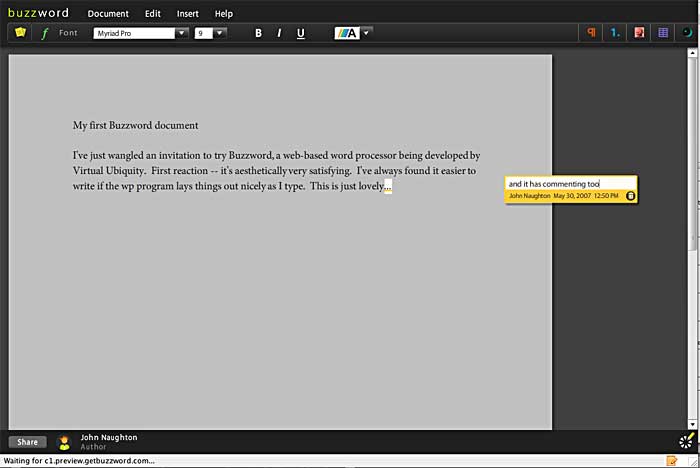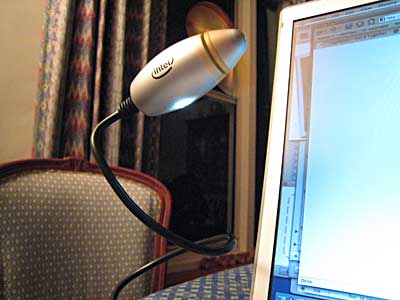
More info here.


More info here.
From the Daily Telegraph
Microsoft has unveiled a coffee table-shaped ‘surface computer’ that responds to touch and is expected to generate a multi-billion dollar market.
Surface is a 30-inch computer display that is embedded on the table surface. It does not need a mouse to operate it, and unlike traditional touch-screens, can recognise more than one finger at a time, allowing small groups to gather around the table and use it at the same time. It also recognises objects that are placed on its surface.
For example, if you are out at a restaurant with friends and you each place your drink on the table, a range of information will appear by your glass, such as menu recommendations to go with your wine, and pictures of the vineyard it came from. You can order your next course with the touch of your finger and even split the bill.
Wonder what’d happen if you spilt Java Beans on it? Also, what do you do when your table crashes?
Hallelujah! My son Brian has finally started a Blog! Nice title too.
Every year, Walt Mossberg of the Wall Street Journal hosts a lucrative talkfest in San Diego. Here’s the official description of the venue.
D: All Things Digital is once again being held at the Four Seasons Resort Aviara, just 30 minutes north of San Diego. All sessions and activities are taking place at the Four Seasons, and D5 has a complete buy-out of the property for maximum use of the resort’s facilities and grounds.
Southern California’s finest resort experience, the Four Seasons offers casual elegance in a breathtaking location that is accented by wildlife and wildflowers. Guests of the resort enjoy the elegance and legendary service of the Four Seasons in an unequalled setting, featuring spacious guest rooms, an Arnold Palmer signature golf course, six floodlit tennis courts, a luxurious spa and expansive fitness center, Family Pool and Quiet Pool areas with deck side whirlpools and the area’s top dining choices…
Er, pass the sickbag, Alice.
GMSV has a nice passing swipe at the pretentiousness of it all.
It may not be the cage match of your fantasies, but Steve Jobs and Bill Gates will take the stage together tomorrow at the D: All Things Digital conference, despite scientists’ worries that the density of their combined egos could open a rift in the space-time continuum.
There’s something uniquely nauseating about the top end of the US technology industry.
Later… Which reminds me, Ken Auletta wrote a typically uncritical, admiring profile of Mossberg in the New Yorker. When journalists become the story, the game’s over.
W.G. Runciman has a perceptive essay on Tony Blair in the current issue of the London Review of Books. Unfortunately, the full version is behind a paywall, but this excerpt gives the flavour of the piece.
To his admirers, his ten-year tenure as prime minister is evidence in itself of his success in satisfying the expectations and wishes of the British electorate. To his detractors, this success has been achieved through a systematic betrayal of the ideals for which the Labour Party was once thought to stand. But if there is one characteristic which in the verdict of history will distinguish him from any of his predecessors, it must surely be his own remarkable brand of naivety – a term which in his case can be stretched to encompass an unwavering air of innocence, combined with an evident capacity for self-delusion and, when it suited him, ruthlessness. Naivety is neither good nor bad in itself, and many famous politicians have had their share of it. But unless Blair, far from being the regular guy as which he likes to project himself, is a hypocrite of astonishing mendacity, the most plausible explanation of both the style and the substance of his prime ministership is that he has remained wilfully blind to how the world outside Parliament and the Labour Party actually works…
Infuriating, isn’t it, how magazines put their best stuff behind the paywall. But here are a couple of further snippets, which I hope can be justified under ‘fair use’! Writing about Blair’s sanctimoniousness, Runciman says:
How much importance should be attached to the holier-than-thou aspect of Blair’s character is a matter about which different people will have more and less sanctimonious opinions of their own. But in the making of government policy, Blair time and again took decisions whose consequences he had failed to think through. You might expect, after the fiasco of the Millennium Dome, that he would have satisfied himself about the funding implications of his eagerness for the Olympic Games of 2012 to come to London, but he clearly chose not to. His unquenchable enthusiasm for targets and performance indicators in hospitals and schools betrayed an ingrained unawareness of the unintended consequences which they were bound to produce. Did he not realise the extent to which the players would manipulate to their perceived advantage the rules imposed on them, and outcomes be distorted as a result? Did he seriously expect (this time, surely, he can’t have done) that his anti-hunting bill would be enforceable? Did he believe that on-the-spot fines would actually be paid by more than a minority of those targeted by the police? Did he really think that inviting John Birt into Downing Street to do ‘blue skies’ thinking on topics that Birt knew little or nothing about would produce novel and practical solutions to familiar problems? There is no evidence that he foresaw what the longer-term consequences of either Welsh or Scottish devolution would be, or that he anticipated his humiliation at the hands of Ken Livingstone over the mayoralty of London. His reform of the House of Lords is stalled, after long vacillation, in a worst of all worlds: a minority of persons of genuine distinction in a sea of chosen cronies, placemen (and women), a rump of self-elected hereditaries, still no mechanism for evicting convicted criminals, and a clutch of ‘people’s peers’ who are no more the choice of the people than the bishops are. He decided to abolish the office of lord chancellor before even a pretence of consultation without its occurring to him that it wasn’t constitutionally possible to do this by simply announcing it from the Downing Street sofa. Criminal justice bills followed one another in a manner that has invited the obvious jibe about moving the deckchairs on the Titanic. Yet he has gone on to the end making pronouncements about what needs to be done, as if he hadn’t had ten years in office in which to do it.
I’ve always thought that Blair and Thatcher were alike in always believing they were right about everything; where they differed is that Blair also believed that he was good.
Runciman is sharp on the ‘special relationship’ with Bush:
It was bad luck for him that the ‘Yo, Blair!’ episode exposed so clearly the reality of his relationship with George W. Bush. Nobody who saw the expressions on their two faces during that exchange can do other than blush for Blair. But why had he been so naive as to think that he could have any influence in changing Bush’s mind about anything? Had he been a different person, there might have been reason to hope (or suspect) that a backstairs deal had been done about which Parliament would not be told but which would have secured a quid pro quo serving Britain’s own national interest. But nowhere has there been a whiff of a pay-off. It looks as if Blair just didn’t realise that he was dealing with a country whose governments are, and always have been, brutally single-minded in their pursuit of what they conceive to be good for America at the expense of anyone else. Did it cross Blair’s mind, when he agreed the terms of extradition for British citizens suspected of criminal offences by the American prosecuting authorities, that he had failed to ensure that it would be genuinely reciprocal, and that the Americans would use it for purposes of their own that had nothing to do with combating terrorism? He may have thought it unfair of the media to portray him as Bush’s poodle to the extent that they so enjoyed doing. But if he seriously believed that he would have such limited influence with George Bush as Margaret Thatcher had had with Ronald Reagan, he should have realised that he would, as the saying goes, have another think coming.
It’s not often that a single essay makes it worth buying a magazine, but this is one of those times.
From Dave Winer
Watching 60 Minutes tonight, on Memorial Day, it’s hard to imagine how we go on living our lives as other Americans give up so much, for something so utterly pointless. As the program ended, it became clear that our soldiers are having the same discussions about the war that we’re having here. They know about the lack of support for the war in America. They process it in different ways. Listening to the soldiers, I can tell they were lied to as we were lied to, and of course because they have so much at stake, it must be so hard to consider that the lies were actually lies. Permalink to this paragraph
This week, for the first time, the President is floating the idea that a massive pullout is coming soon. Permalink to this paragraph
Oh what an effect that must have on our soldiers in Iraq. The futility in risking so much knowing that the outcome, instead of Mission Accomplished will be Nothing Accomplished. Other than the unnecessary sacrifice of a nation, ours, and its army.

It’s a light! It’s a fan! It’s both! And it’s powered by my USB port. Essential for dark nights in the tropics. Quentin brought it back from the Antipodes. It’s badged by Intel. Perhaps they’re getting out of the chip business.
You may remember an idiotic BBC Panorama ‘expose’ of the terrible threat to our children posed by Wi-Fi networks. Here’s Wellington Grey’s useful graphical summary of Panorama‘s investigative methodology.
Well, that’s what it says here…
Hamburg – Volkswagen is planning to offer a hybrid version for every model starting in about two years, according to Germany’s Auto Bild newspaper.
A decision has not yet been made on what electric components would be used for which model. But there are plans for both a micro-hybrid system with a battery charged by braking regeneration energy and a full hybrid solution, according to the paper.
VW CEO Martin Winterkorn in recent interviews confirmed that the company was working on a small VW hybrid that could be launched ‘fairly quickly’ onto the market.
From Guardian Unlimited…
Seeking to popularise business stories and taking the consumer’s point of view has led to lapses in impartiality at the BBC and has provided ammunition for critics to accuse the corporation of “dumbing down” its business journalism, according to an independent report published today…